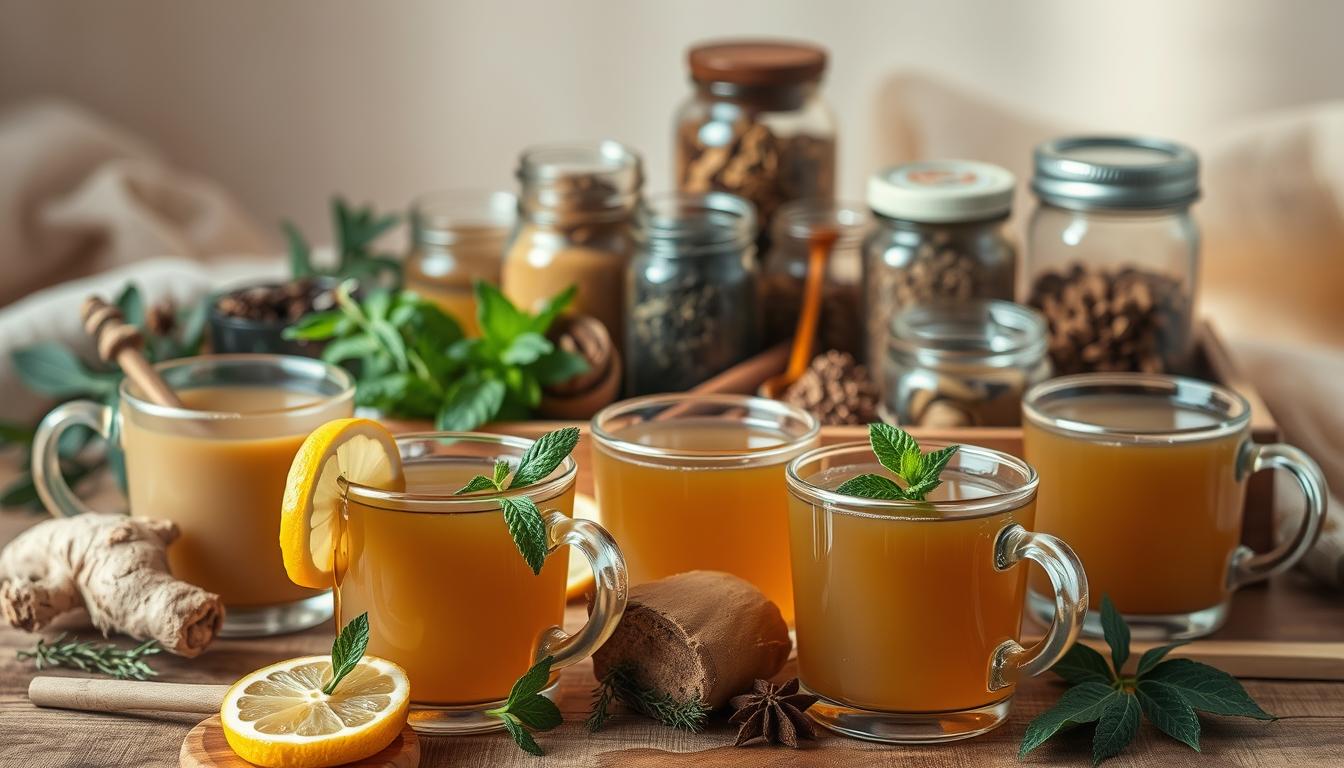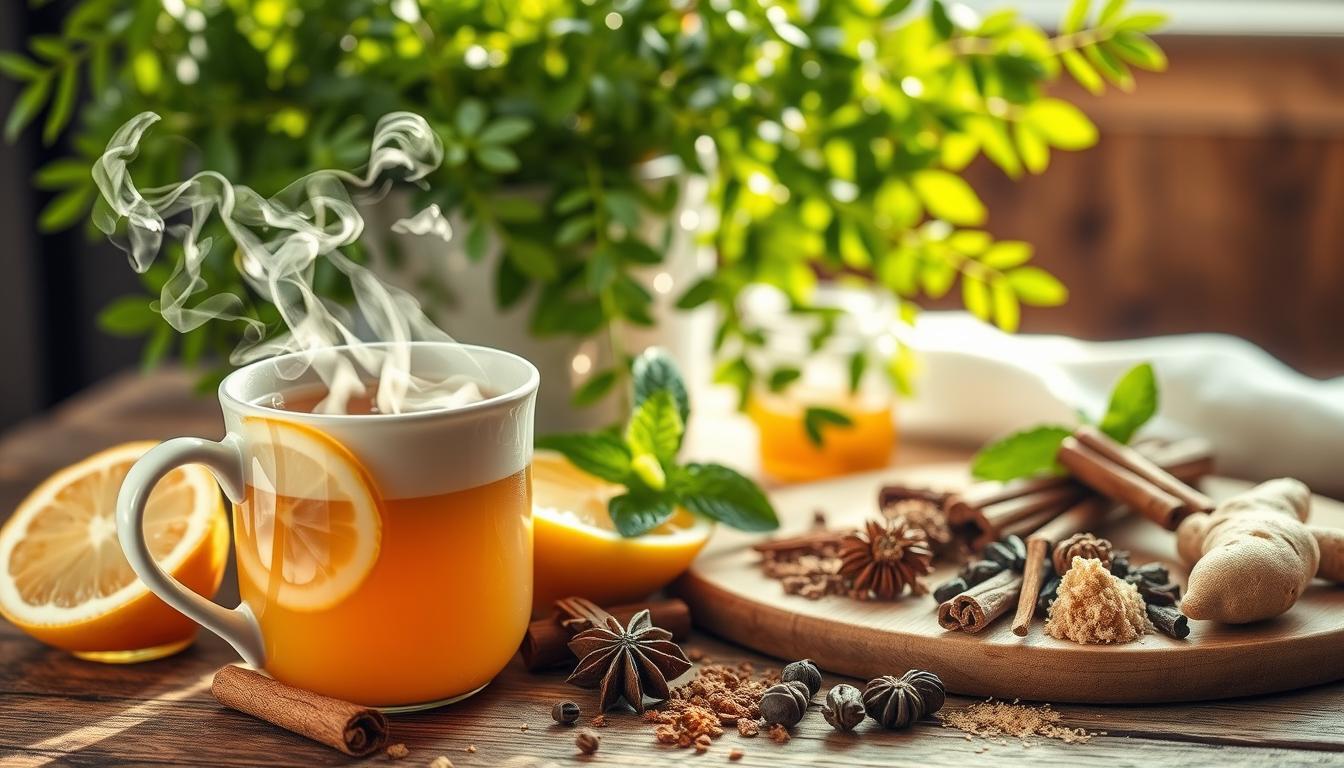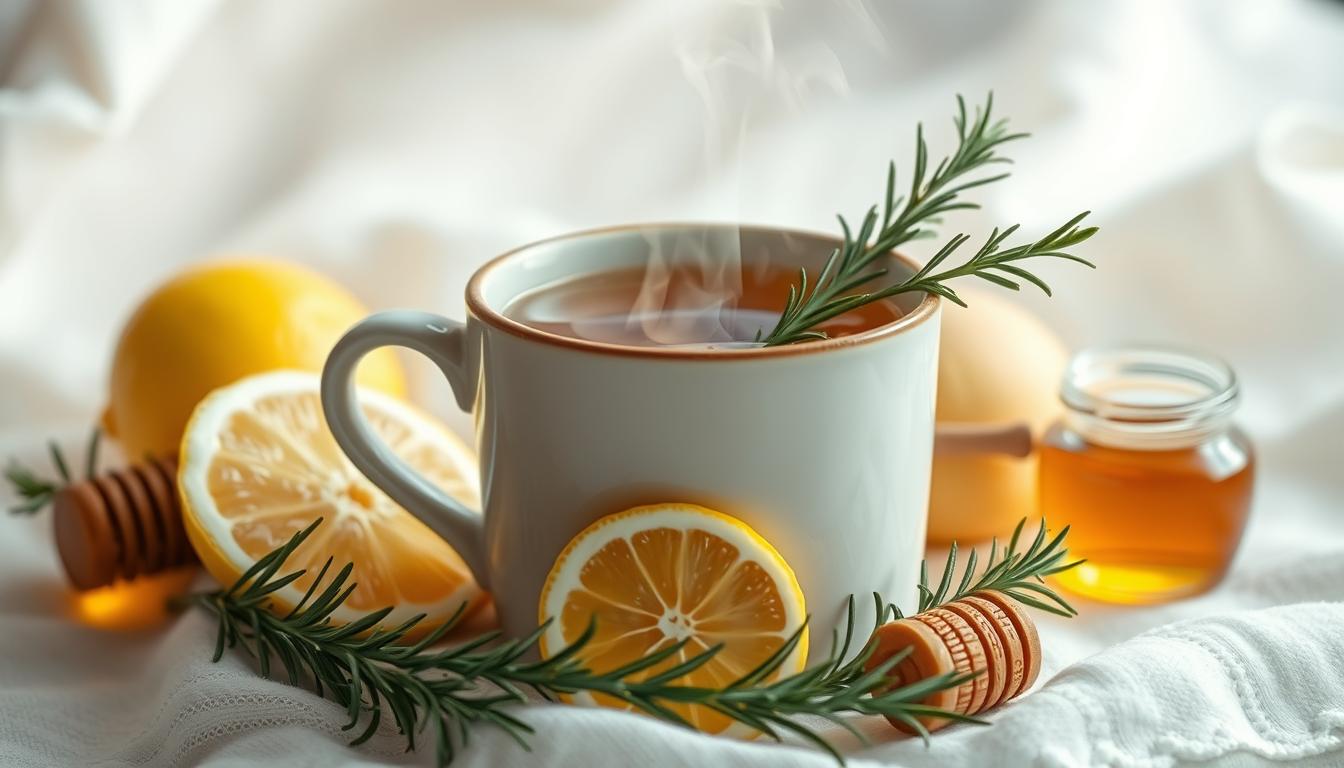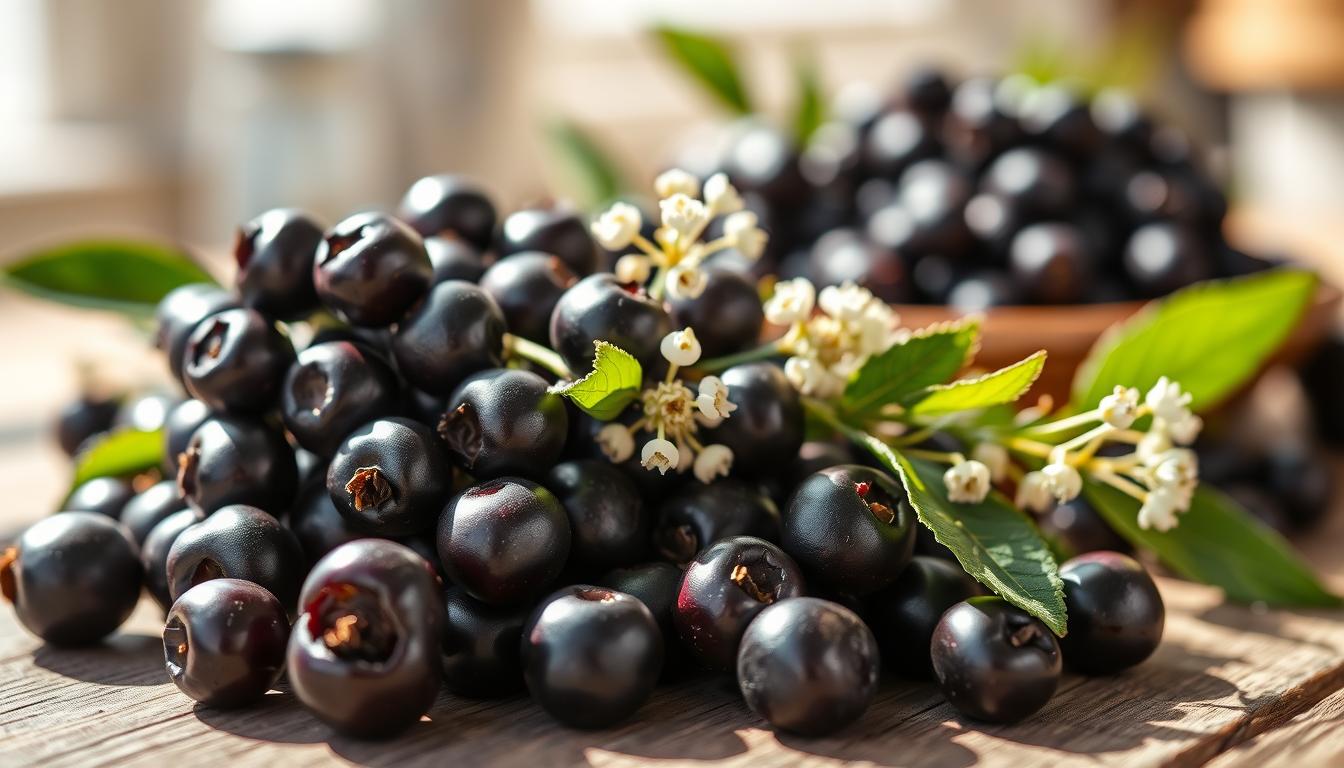When you’re feeling sick, a warm cup of herbal tea can be more than comforting. It helps ease symptoms and supports your recovery. Herbal teas for cold and flu relief have soothing properties. They can help with sore throats, congestion, and feeling tired.
We’ll look at natural flu remedies using herbal ingredients. Learn how cold relief teas can be good home remedies. They help keep you nourished during the cold and flu season.

Key Takeaways
Herbal teas can provide soothing relief from cold and flu symptoms.
Warm drinks for flu can help alleviate discomfort such as sore throats.
Various herbal ingredients offer unique benefits for recovery.
Natural flu remedies are accessible and easy to prepare at home.
Cold relief teas can enhance your overall well-being during the season.
Different herbal blends can cater to your unique health needs.
Understanding Cold and Flu Symptoms
Cold and flu symptoms can really mess up your day. They make it hard to do everyday things. Symptoms like a sore throat, feeling tired, stuffy nose, and cough are common.
Recognizing these symptoms can help you determine whether it’s a cold or flu. This is key for getting the right treatment.
Cold symptoms come on slowly. You might have a runny or stuffy nose, feel a bit tired, and sneeze a lot. On the other hand, flu symptoms hit fast and hard. You could have a high fever, feel extremely tired, and have muscle aches. You could also have a scratchy throat and feel congested.
It’s important to understand your symptoms. They show how your body is fighting off the infection. Knowing if you have a cold or the flu helps you get the right care. This makes your recovery easier.

Importance of Natural Remedies for Cold Relief
In recent years, more people are looking for natural ways to fight colds. They want to avoid the side effects of traditional medicines. Instead, they turn to herbal remedies for colds that are gentler on the body.
Natural remedies do more than just ease symptoms. They also boost your immune system. By making lifestyle changes and eating right, you can stay healthy. Herbal teas, like ginger and chamomile, are packed with healing compounds.
Herbal remedies for colds are easy to find and use. They offer a natural way to feel better during cold and flu seasons. By choosing these remedies, you can take care of your health in a gentle way.

Herbal Teas for Cold and Flu Symptom Relief
Herbal tea can be a soothing remedy for cold and flu symptoms. Many teas have special properties that can help with sore throats or congestion. Here are some good herbal teas to try:
Ginger Tea for Immune Support
Drinking ginger tea may give your immune system a boost. It helps reduce inflammation, easing sore throats and nausea. Drinking ginger tea can help your body fight off sickness better.
Chamomile Tea for Rest and Relaxation
Chamomile tea is perfect for when you’re not feeling well. It helps you sleep and relax. The antioxidants in chamomile tea can also boost your immune system and soothe a sore throat.
Peppermint Tea for Congestion Relief
Peppermint tea is great for relieving congestion. The menthol in peppermint can soothe a sore throat and clear your sinuses. It also helps stop coughing, making it a top choice for cold symptoms.

Popular Ingredients in Healing Teas
Herbal teas are loved for their health benefits, more so during cold and flu seasons. Knowing the key ingredients can help you pick the right teas for your symptoms. We’ll look at elderberry, thyme, and licorice root, each with special properties for flu comfort.
Elderberry for Colds and Flu
Elderberry is a strong ally against colds. Its extracts can shorten and lessen the severity of cold and flu symptoms. Elderberry is full of antioxidants, boosting your immune system, reducing inflammation, and improving your health when sick.
Thyme Tea Benefits for Respiratory Health
Thyme is more than just a kitchen herb; its tea is great for your lungs. It has antibacterial properties that help with coughs and bronchial spasms. Thyme tea can also thin mucus, helping you breathe better when you’re congested.
Licorice Root Tea for Soothing the Throat
Licorice root tea is known for its ability to calm throat discomfort. It’s been used for ages to calm sore throats. Its anti-inflammatory properties ease pain and help your throat heal, making it a must-have in your tea collection.

Brewing Tips for Maximum Effectiveness
Learning to make effective herbal tea blends can really improve your health and happiness. Proper brewing techniques can maximize the benefits of herbal tea. You can mix different herbs to create teas that taste good and help your body.
Choosing the Right Tea Blend
Knowing which herbs go well together is key to making great tea blends. Try mixing ginger with lemon for a tea that boosts your immune system. Or, blend chamomile with lavender for a calming tea to enjoy in the evening.
Optimal Brewing Time and Temperature
The right brewing time and water temperature are crucial for making great herbal tea. Most teas need boiling water for 5 to 10 minutes to release their oils and benefits. This way, every sip is full of flavor and health goodness.
Usage Suggestions and Precautions
Exploring herbal teas is exciting, but knowing how to use them safely is key. You want to pick teas that are good for you and fit your health needs. This is very important for pregnant people or those with certain allergies.
Safe Herbal Tea for Pregnant and Sensitive Individuals
Some herbal ingredients can be risky. Get medical guidance before trying new herbal teas, especially if you have health concerns. This is very important if you’re pregnant or taking medicine. Choosing safe teas helps keep you healthy without harm.
Recommended Serving Size and Frequency
It’s good to know how much tea is right for you. Aim for 1-3 cups a day. But remember, too much tea can cause problems. Tune in to your intuition and select teas that feel good for you.
Combining Teas for Enhanced Relief
Tea blending is an art that lets you boost the benefits of herbal teas. By mixing different ingredients, you can make unique teas that target specific symptoms. Knowing what each ingredient does helps you create the perfect blend for you.
Creating Anti-Inflammatory Herbal Blends
Many herbs are great at fighting inflammation, making them perfect for relief. For example, blending ginger tea with chamomile creates a soothing mix. It helps reduce inflammation and eases cold and flu symptoms.
Adding turmeric to your blends is a smart move. It’s known to fight inflammation well.
Mixing Teas for Personalized Healing
Personalized teas can tackle your specific symptoms and taste likes. Mixing licorice root with peppermint makes a blend that soothes your throat and clears congestion. Trying out different tea mixes not only tastes better but also helps with more symptoms at once.
This way, you get a tea that’s not only tasty but also really helps you feel better.
Conclusion
Exploring different herbal teas shows their big role in fighting cold symptoms. Adding ginger, chamomile, and peppermint teas to your routine can help ease discomfort. These teas have special properties that boost immunity and clear congestion.
Using these herbal teas can make you feel better and improve your overall health. Choosing natural remedies for colds helps you take care of your health in a smart way. Having these teas ready can help you face cold or flu symptoms head-on.
Remember, a healthy lifestyle is key. Drinking herbal teas is a great way to focus on natural health. It contributes to your everyday vitality and equilibrium. Enjoy the calming effects of herbal teas and take a step towards feeling better.




GIPHY App Key not set. Please check settings